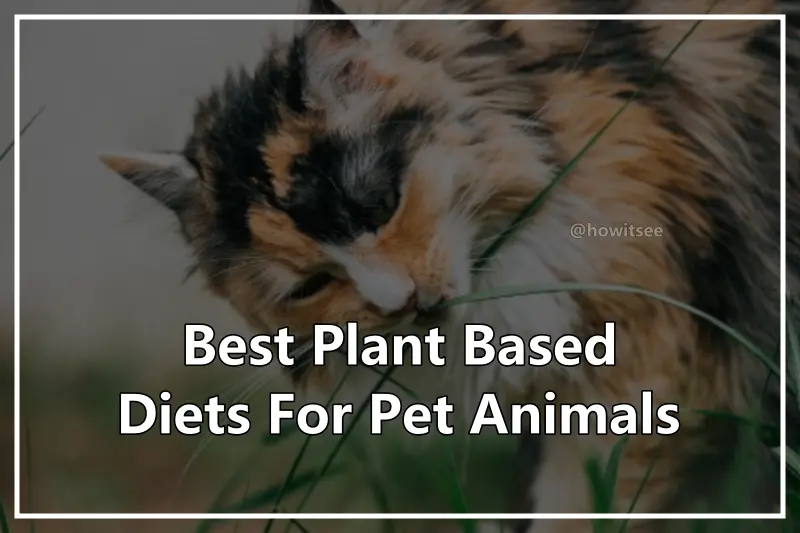Both companion animals and their owners are seeing the benefits of switching to a plant-based diet. Animals as pets benefit greatly from plant-based diets since they supply a vast range of nutrients, vitamins, and minerals essential to good health.
Animals kept as pets can get all the nutrients they need from a plant-based diet and even more besides. Compared to diets that include animal products, plant-based diets are healthier because they are lower in fat, fewer in calories, and higher in fibre.
There are a lot of the best plant-based diets for pet animals. Improved digestion, greater dental health, and a reduced risk of obesity are a few more benefits linked to plant-based diets.
We’ll go over some of the top plant-based diets for pets and share some recipes for those diets as well. The nutritional needs of pets will also be covered, along with the advantages of plant-based diets and tips for choosing the best plant-based pet food.
In addition, we will supply some simple dishes that are not only healthy but also delicious. This article will help you give your pet the healthiest plant-based food possible by the time you finish reading it.
Which Pet Animals Can We Feed A Vegan Diet?
Herbivorous animals include rabbits and guinea pigs. Hamsters are one example of an omnivore. Last but not least, there are the carnivores, such as cats, that must eat meat to stay alive. The nutritional requirements of all animals must be met.
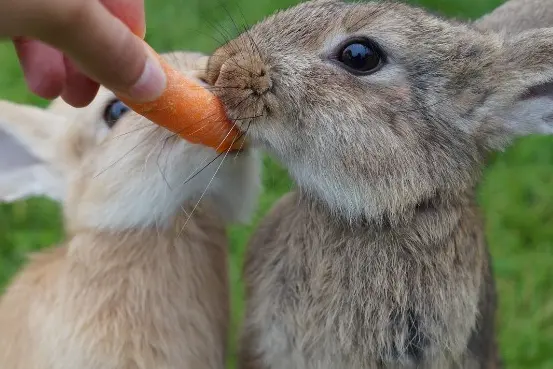
Animals in captivity can, indeed, be fed plant-based diets:
- First, as more individuals learn about the health benefits of plant-based diets, the trend toward feeding animals vegan diets is growing.
- Vegan diets for dogs are acceptable if they provide a complete and balanced source of all the essential vitamins and minerals( only theoretical).
- It is not advised to offer a vegan diet to a cat because cats are obligate carnivores and need proteins from animal sources to stay healthy.
- Vegan diets are suitable for all animals, including rabbits, guinea pigs, and other tiny rodents. They need a high-fibre diet, and plant foods like hay and fresh vegetables can supply that.
- Supplementing a vegan diet with the amino acids, vitamins, and minerals that birds need is beneficial, even for birds like parrots.
- Vegan food is safe for reptiles, including turtles and lizards. Fruits, vegetables, and other plant-based foods should be prominent in these diets.
Pets We Can Feed Vegan Diet
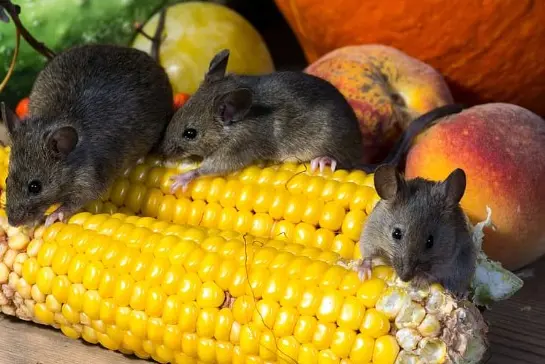
Many other domesticated animals either don’t consume meat or can get by quite well on a vegetarian diet. Here are some of them:
- 1. Rabbits:- Nothing to worry about there; rabbits enjoy a plant-based diet of hay and veggies. The soft pellets they expel and subsequently consume may look like animal products but are only partially digested plant matter.
- 2. Guinea pigs:- These cute little guys, like rabbits, do well on a plant-based diet.
- 3. Hamsters:- In most cases, hamsters are fed store-bought food, the contents of which may or may not be safe. Hamsters, however, can survive without meat, just like rats and mice.
- 4. Gerbils:- Gerbils, like hamsters, can eat almost anything. They require a high-quality pellet blend due to their delicate tummies. An overabundance of fresh food can harm their digestive system.
- 5. Mice:- Mice can thrive on vegan diets despite their omnivorous nature in the wild; nevertheless, a meal mix designed for mice is recommended. This guarantees that they will receive all the necessary nutrients.
- 6. Rats:- Even though they are among the most omnivorous rats, you may ensure their health by feeding them a vegan mix supplemented with all the essential nutrients. Rats that overindulge in animal fat develop obesity and perish early.
- 7. Chickens:- If you keep an eye on a free-range hen, you’ll see that she’ll eat anything from grass and beetles to worms and, if you’re not cautious, the entire contents of your garden. This combination of plant and animal ingredients is mirrored in most chicken feed. However, vegan chicken feed is commercially available; anecdotal evidence suggests chickens can thrive. Even if you feed them vegan layers pellets, your hens will still scratch the ground for worms and bugs, reducing their egg production.
- 8. The parrot family:- Budgies and parrots pose no problems for vegans unless they are being bred. Female birds tending to eggs require a higher protein diet, such as that provided by eggs or cooked meat. However, some options are suitable for vegans.
Pets We Can’t Feed Vegan Diets
Because their nutritional needs are so different from those of humans or herbivores, some pets simply cannot do well on a vegan diet. It’s vital to keep in mind that pets have different nutritional demands and should not be fed the same diet as their owners, even if the owners prefer to pursue a vegan lifestyle for ethical or environmental reasons.
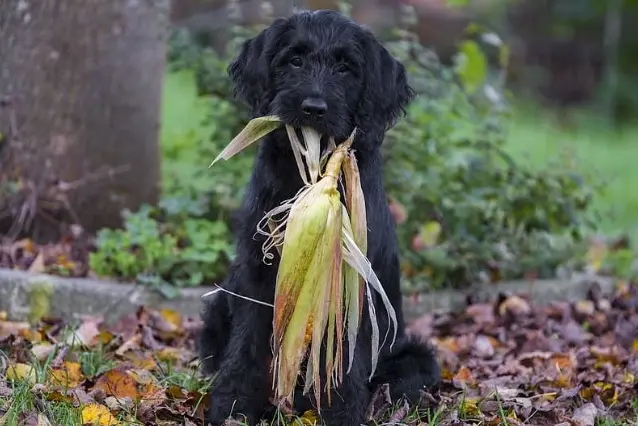
Some common household pets cannot be given a vegan diet, including:
- 1) Dogs: Because of their omnivorous nature, dogs need both meat and vegetables in their diet. Dogs still require a substantial amount of animal protein even if their commercial meal contains some plant-based elements. Heart disease, skin difficulties, and digestive disorders are just some of the illnesses that a vegan diet might exacerbate.
- 2) Cats: Obligate carnivores like cats need a lot of meat and animal products to stay healthy. Taurine, an important amino acid, is exclusively found in animal products and can’t be made by humans. Cats should not be fed a vegan diet since it can cause a variety of health concerns, including blindness, heart disease, and difficulties with the urinary tract.
- 3) Ferrets: Due to their status as obligate carnivores, ferrets need a diet rich in animal products like protein and fat in order to thrive. They need a diet high in protein and fat from meat because they have trouble digesting plant foods. Malnutrition and other health issues are possible outcomes of a vegan diet for ferrets.
- 4) Reptiles: Depending on their species, reptiles have highly particular dietary needs. There are herbivore reptiles, carnivore reptiles, and omnivore reptiles. No reptile should follow a vegan diet since it fails to provide them with enough of the nutrients they need.
It’s worth noting that while some pet owners may opt to feed their animals a vegan diet out of moral conviction, doing so can harm their dogs’ health. Always check with your vet first to ensure your pet is getting the proper nutrition before drastically changing its diet.
Best Plant-Based Diets For Pet Animals
There are a lot of the Best Plant-Based Diets For Pet Animals. Constantly consult your vet before drastically altering your pet’s food. Some human foods may be OK for your pet, but others may be harmful, so providing a balanced and nutritious diet is crucial.
Having said that, the following are examples of the Best Plant-Based Diets For Pet Animals:
1) Rabbits on a Plant-Based Diet
Herbivorous pets like rabbits eat hay, fresh vegetables, and fruits. Hay is essential for rabbits’ intestinal health. Rabbits need at least 70% hay. Rabbits need hay and fresh vegetables like leafy greens, carrots, and broccoli.
For intestinal health, introduce new vegetables slowly. Due to their sugar content, fruits can be offered as treats in moderation. Rabbits have sensitive digestive systems; therefore, certain meals can hurt them. Avoid bread, spaghetti, and sweets.
Iceberg lettuce and potatoes are also toxic in high quantities. Rabbits need a plant-based diet of hay, fresh vegetables, and fruits.
2) Guinea Pigs on a Plant-Based Diet
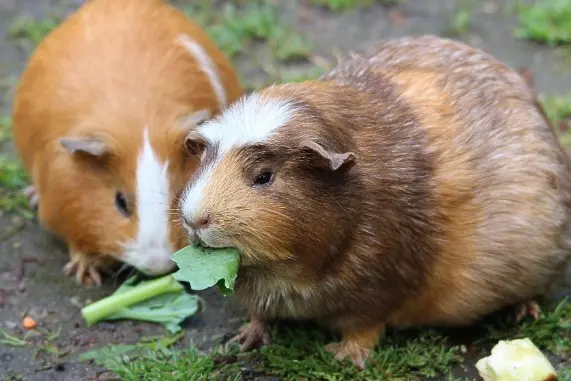
Herbivorous guinea pigs need a plant-based diet. High-quality hay, fresh vegetables, and restricted fruits and pellets should be their diet. Guinea pigs need limitless hay.
Timothy hay, heavy in fibre and low in calcium, is ideal for their digestive and urinary health. Orchard and meadow hay are also available. Guinea pigs should be fed a range of fresh vegetables.
Kale, romaine, parsley, bell peppers, carrots, and cucumbers are terrific choices. Iceberg lettuce, spinach, and celery are high in water and poor in nutrients, so feed them sparingly. Due to their high sugar content, fruits should be offered sparingly as treats.
Guinea pigs like strawberries, blueberries, and raspberries. Pellets can augment a guinea pig’s diet in tiny amounts. Choose pellets with high fibre content and guinea pig formulation.
Guinea pigs cannot synthesize vitamin C; thus, they need fresh supplies. They should eat vitamin C-rich vegetables, including bell peppers, kale, and parsley. Hay, fresh vegetables, restricted fruits, and pellets are a plant-based diet.
3) Tortoise on a Plant-Based Diet
Tortoises can live 150 years in captivity. Their health depends on a plant-based diet. Tortoises eat grasses, weeds, and herbs. When available, they devour cactus pads, flowers, and fruits.
Tortoises are herbivores and need a plant-based diet. High-protein or low-fibre diets can cause metabolic bone disease, liver illness, and shell malformations.
Tortoises need a range of vegetation for sustenance. Fresh, organic greens like dandelion, collard greens, and kale, as well as squash, carrots, and sweet potatoes, help keep them healthy and happy. Due to their sugar level, tortoises should only eat fruits in moderation. As a treat, give fruits.
Conclusion
You won’t be short of options when looking for a vegan pet. However, keeping them is significantly more challenging. The primary objective should be providing each pet with nutritionally complete and balanced food for its specific needs.
Here, we conclude our article on “Best Plant-Based Diets For Pet Animals.” We hope you like our post. We will be back with another exciting article. Till then, stay tuned with us.
Also Read:

A writer who studied agriculture. Nature has always drawn me in, and my main goal in writing about it is to discover some of its secrets. You can usually find me reading Bengali and English masterpieces or filling the room with lovely music if I’m not engrossed in nature or anime material. I adore playing the guitar. I’m also that friend of yours who enjoys playing video games.
